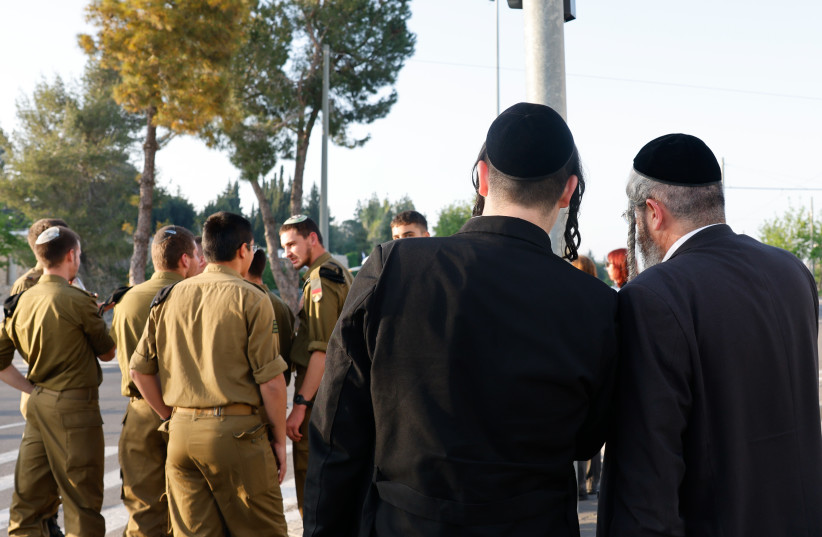On Tuesday, the United Torah Judaism (UTJ) Party introduced a draft for a new basic law declaring Torah study “a supreme value in the heritage of the Jewish people.”
As reported by this paper’s Eliav Breuer and Yonah Jeremy Bob, the bill reads, in part: “The State of Israel as a Jewish state views the encouragement of Torah study and Torah students with utmost importance, and regarding their rights and duties, those who dedicate themselves to studying Torah for an extended period should be viewed as having served a significant service to the State of Israel and the Jewish people.”
Though noble and innocuous on the face of it, the UTJ bill is meant to enshrine in law the exemption from military service granted to students in yeshivot (religious academies) and prevent the High Court of Justice from striking it down on the basis of inequality.
“The previous law, which expired at the end of June, was passed in 2014 and was amended in 2015. It set allotments of haredi draftees to the IDF per year and sanctioned yeshivot that did not meet these allotments. In addition, it gave haredi men who reach the age of 26 a final exemption from service,” Breuer and Bob explain.
“In September 2017, the Supreme Court deemed the bill unconstitutional, since the exemption it gave was ruled to be too sweeping and thus violated the notion of equality. The court initially gave the Knesset a year to amend the bill, but this was delayed 15 times due to the recurring elections since then.”

UTJ’s new bill has been met with a wave of criticism
“The day after canceling the reasonableness standard, the most unhinged coalition in the state’s history is beginning to celebrate at our expense,” wrote Opposition Leader Yair Lapid on Facebook. “The government of destruction, which does not cease shouting about [reservists’] ‘refusals’ [to continue volunteering for duty], proposes the ‘draft-dodging and refusal to serve’ bill and even dares call it ‘Basic Law: Torah Study,’” he said.
National Unity Party leader Benny Gantz – who has served as both defense minister and IDF chief of staff – wrote on Twitter that while Torah study has been “central in the lives of Jews over the generations,” the bill would “empty” the notion of the Army of the People, and would cause “strategic damage to the future of the State of Israel.”
Coalition figures also sharply criticized the bill.
“Serving in the IDF is a civil obligation of the highest order,” said Defense Minister Yoav Gallant. “Studying Torah is an important foundation for maintaining our [Jewish] spark as a people and I have respect for those who study.”
“It is important to remember: there is no place for comparing IDF service to studying Torah,” he added. “Defending the state in the form of IDF service is a supreme obligation.”
Even a senior official with UTJ’s fellow haredi (ultra-Orthodox) party, Shas – which has also sought to exempt yeshiva students from army service – slammed the bill as causing “enormous damage” to Torah study, noting that its introduction “in the midst of a civil crisis and a severe schism in the nation sabotage[s] the cause and [leads] to severe incitement against yeshiva students.”
Torah study is undoubtedly a supreme Jewish value, and we agree with Gallant that it has played a central role in preserving Jewish life and the Jewish people for millennia. Many would even agree that those who engage in Torah study provide a vital spiritual service to Israel.
That spiritual service, however, cannot come at the expense of military service.
The IDF has developed frameworks for haredi young men to serve in environments tailored to their religious needs, including bases populated exclusively by male soldiers, kosher food of a more stringent standard – and, yes, dedicated time for Torah study. It has done so over the objections of groups that oppose gender segregation and other aspects of these arrangements because the importance of more fully integrating the haredi community into the military is viewed as critical.
“The Army of the People” cannot merely be a hollow slogan. It is important that Israel do what it must to ease the haredi community’s path toward national service – with care, sensitivity, and respect for Torah study.
